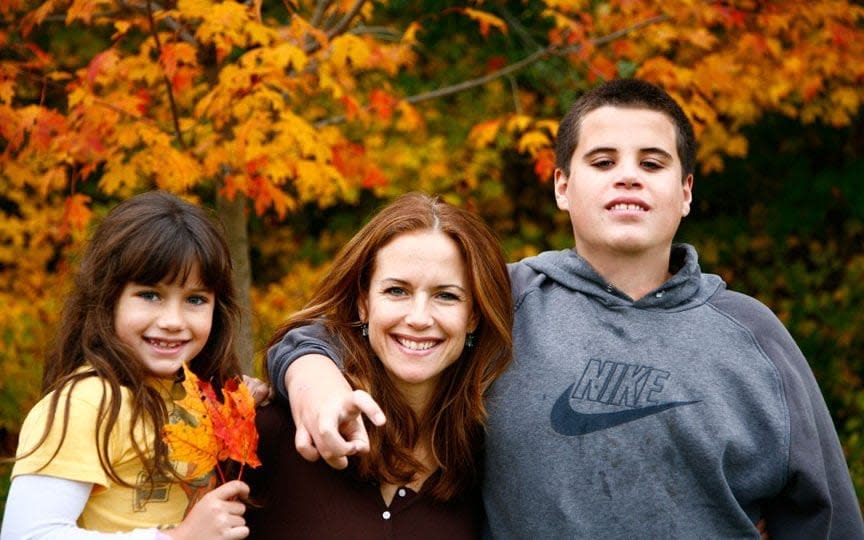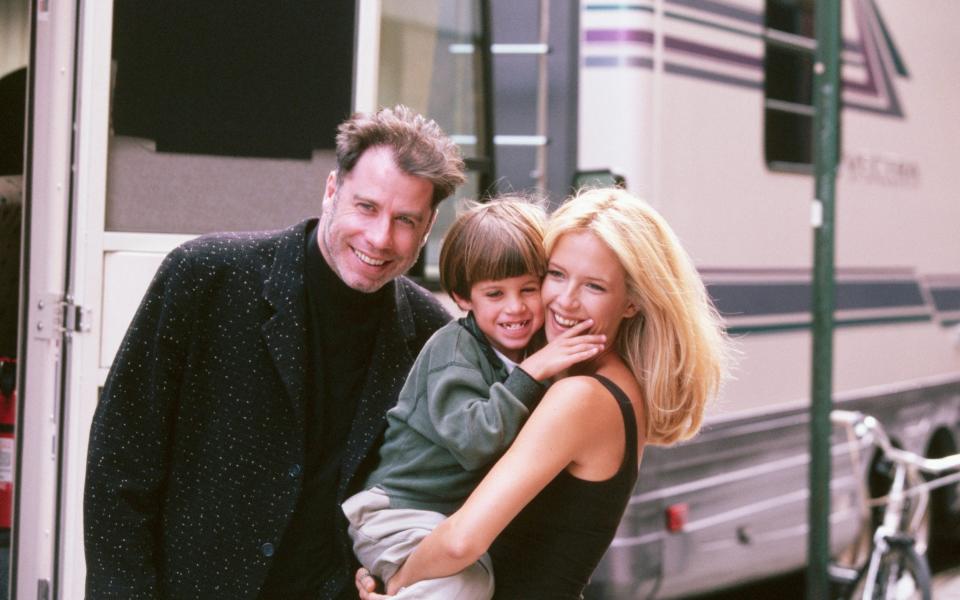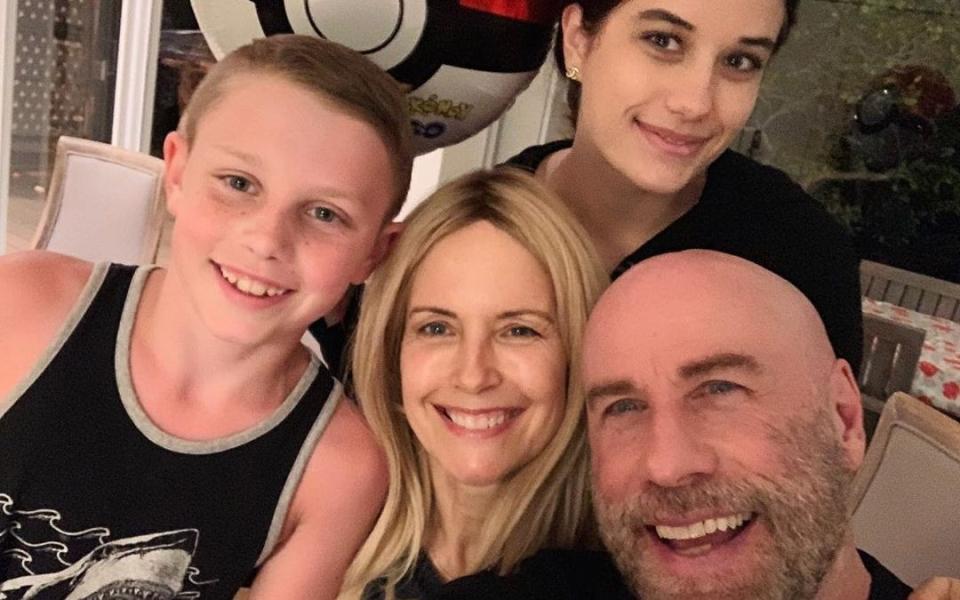John Travolta and the tragedy of loss that surrounds him

Fame and wealth may insulate you against many of life’s rougher edges, but they offer little protection when it comes to grief and loss. And, despite a glittering career that includes a Golden Globe award and two Oscar nominations, not to mention a fortune estimated last year at £150 million, John Travolta has had more than his fair share of both – though, of course, when it comes to losing loved ones, there is no such thing as fair.
On Monday, the Pulp Fiction star announced the death of his wife of almost 29 years, Kelly Preston, following a two-year battle with breast cancer. The 57 year-old actress had shunned the spotlight since 2018, when the couple co-starred in the gangster film, Gotti, her diagnosis a closely-kept secret. As recently as Fathers’ Day, Preston made an all-smiles post on Instagram, giving every impression that all was well in their Hollywood world.
Less than a month later, however, Travolta has lost his companion of three decades – “marriage doesn’t just happen on its own,” Preston said when promoting Gotti at the Cannes Film Festival, “you have to keep creating love” – the latest blow in what, even before her death, he had described as “a life filled with variations of loss”.
In 2009, he and Preston experienced every parent’s worst nightmare when their 16-year-old son, Jett, died suddenly after having a seizure and hitting his head on a bathtub on a family Christmas holiday to the Bahamas. There had been speculation about Jett’s health for many years – intrusive speculation is another recurring feature of Travolta’s life, including over his sexuality – but it was only after his death that the couple revealed that their son, who had suffered seizures throughout his childhood, had also been diagnosed with autism.

What fewer people know is that in 1976, at the start of his career, 23-year-old Travolta also lost his first love to the same disease that would later claim his wife. On the set of the TV movie, The Boy in the Plastic Bubble, he had fallen for his on-screen mother, the Emmy-winning actress Diana Hyland, who was 18 years his senior. “I have never been more in love with anyone in my life,” he later remembered. “We were like two maniacs talking all the time on the set of Bubble. After a month it became romantic.”
Tragedy followed shortly afterwards, however. In the same year that Saturday Night Fever made him an international star and sex symbol as the cleft-chinned, white-suited disco king, Tony Manero – winning him the first of those Oscar nominations – Travolta was at Hyland’s bedside as she lost her own battle with breast cancer. Her son Zachary subsequently revealed his mother died in Travolta’s arms.
Such trauma so early in his adult life, Travolta reflected in an interview for this paper in 2014, had “taken the edge off death” and bequeathed him a certain strength. “I’m probably less terrified of death than your average fellow now,” he said, “because people so near to me have suffered before their time, and I just feel that if they can do it, so can I. I almost feel like it’s disrespectful to fear it when others have been able to do it.”
He was talking on that occasion about how he coped with the death of Jett. His family’s distress – at the time they had a younger daughter, Ella Bleu, and the following year, when Preston was 47, she gave birth to a son, Benjamin – was compounded in the immediate aftermath by a local ambulance driver and his lawyer allegedly trying to extort $25million from the couple, by threatening to release sensitive details about Jett’s death. Travolta gave evidence at a high-profile criminal trial but later decided to stop pursuing the case, citing the severe strain on his family.

At the time, Travolta told the Telegraph’s Celia Walden, he had felt so utterly overwhelmed by grief that he seriously considered throwing in the acting towel. Instead, he went on, in 2014, to take on the challenge of The Forger, a thriller which echoed his own recent experience: starring as a convicted criminal who is released early from prison to look after his young son, facing death with an inoperable brain tumour.
And it was the support of his co-believers in the Church of Scientology that he credited with enabling him to regain what he describes as his natural state as “a glass half full man” and “an optimist by nature”.
Our secular, sceptical western society has largely turned its back on religion, but when it comes to grief and loss, belief in a higher power or a higher purpose still retains a strong resonance. Some find their comfort in Buddhist ideas of reincarnation, or Christianity’s promise of a heavenly afterlife.
Travolta himself has spoken in the past of how he retains some of the beliefs he picked up growing up as the youngest of six in a New York suburb with his Italian American father and Irish mother. The traditional Catholic belief that “a person’s soul lives on forever” is, he said in that 2014 interview, something he still values.
But by that time, he had also been part of the controversial Church of Scientology for almost four decades. For Travolta – Preston, too, was a member; the pair starring in the universally-panned screen adaption of founder L.Ron Hubbard's novel, Battlefield Earth in 2000 – it proved to be his salvation after the death of Jett.

“I don’t know what I would have done if I hadn’t had the support of Scientology,” he said. “I don’t think I could have got through it. They were with me every day after Jett died. They even travelled with me when I needed to get away. And for a solid two years it was like that: they were there every day.”
Scientology, he claimed “really does provide a method that helps you handle extreme tragedies.” Among Hubbard’s teachings is the belief that those who die are born again in a new body – unlike reincarnation, which involves an element of judgement for past lives, Hubbard once described his vision as, “simply living time after time, getting a new body, eventually losing it and getting a new one”.
Travolta first embraced Scientology in 1975 after being introduced to it by the actress Joan Prather on the set of The Devil’s Rain in Mexico. “I wasn’t well and she gave me what’s called ‘an assist’,” he later recalled. “I got well very quickly after that, but when I say quickly, I mean 30 minutes later.”
Scientology, he has said on numerous occasions, offers not just ideas, but also practical tools – “workable technology” is how he refers to them – to banish pain. “I believe L Ron Hubbard resolved the human mind,” he said in 2013, “and in resolving it he has also resolved human pain – that’s what I really think has happened here.”
Whatever the merits or otherwise of his religion, Travolta will need all the tools at his disposal to cope with this third tragedy. In the Instagram post announcing his wife’s death, he added: “I will be taking some time to be there for my children who have lost their mother, so forgive me in advance if you don’t hear from us for a while. But please know that I will feel your outpouring of love in the weeks and months ahead as we heal.”
Grief is not something that can be overcome by force of will, just as cancer – as Travolta knows all too well – is not something that can always be battled and defeated. Perhaps he also knows, more than most, though, that time can bring a kind of healing.

